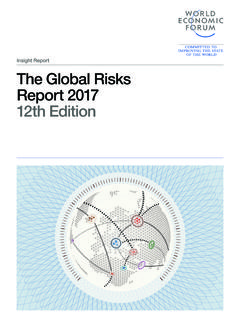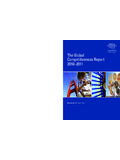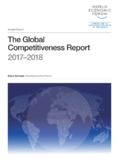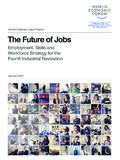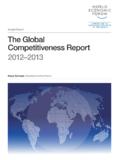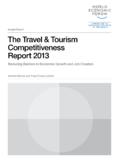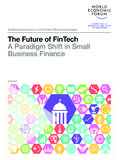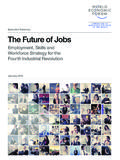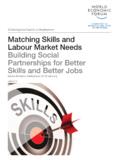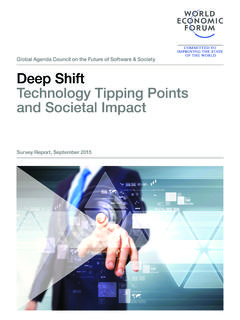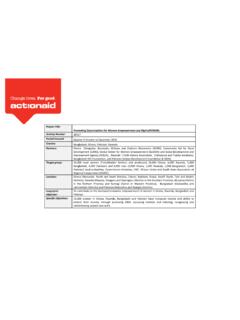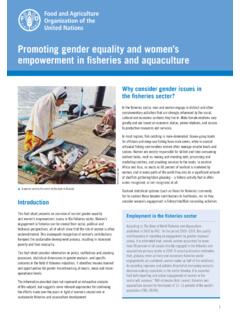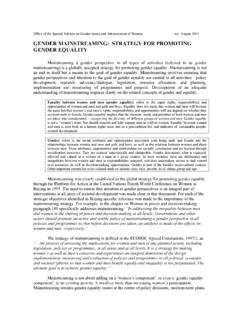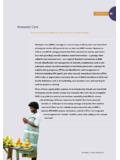Transcription of Insight Report Towards a Reskilling Revolution
1 Insight ReportTowa r d s a Reskilling RevolutionA Future of Jobs for AllJanuary 2018In collaboration with The Boston Consulting GroupWorld Economic Forum91-93 route de la CapiteCH-1223 Cologny/GenevaSwitzerlandTel.: +41 (0)22 869 1212 Fax: +41 (0)22 786 2744 Email: Economic Forum 2018 All rights part of this publication may be reproduced or transmitted in any form or by any means, including photocopying and recording, or by any information storage and retrieval 220118 TERMS OF USE AND DISCLAIMER Towards a Reskilling Revolution : A Future of Jobs for All (herein: Report ) presents information and data that were compiled and/or collected by the World Economic Forum (all information and data referred herein as data ). Data in this Report is subject to change without terms country and nation as used in this Report do not in all cases refer to a territorial entity that is a state as understood by international law and practice.
2 The term covers well-defined, geographically self-contained economic areas that may not be states but for which statistical data are maintained on a separate and independent the World Economic Forum takes every reasonable step to ensure that the data thus compiled and/or collected is accurately reflected in this Report , the World Economic Forum, its agents, officers, and employees: (i) provide the data as is, as available and without warranty of any kind, either express or implied, including, without limitation, warranties of merchantability, fitness for a particular purpose and non-infringement; (ii) make no representations, express or implied, as to the accuracy of the data contained in this Report or its suitability for any particular purpose; (iii) accept no liability for any use of the said data or reliance placed on it, in particular, for any interpretation, decisions, or actions based on the data in this parties may have ownership interests in some of the data contained in this Report .
3 The World Economic Forum in no way represents or warrants that it owns or controls all rights in all data, and the World Economic Forum will not be liable to users for any claims brought against users by third parties in connection with their use of any World Economic Forum, its agents, officers, and employees do not endorse or in any respect warrant any third-party products or services by virtue of any data, material, or content referred to or included in this shall not infringe upon the integrity of the data and in particular shall refrain from any act of alteration of the data that intentionally affects its nature or accuracy. If the data is materially transformed by the user, this must be stated explicitly along with the required source data compiled by parties other than the World Economic Forum, users must refer to these parties terms of use, in particular concerning the attribution, distribution, and reproduction of the data for which the World Economic Forum is the source (herein: World Economic Forum ) is distributed or reproduced, it must appear accurately and be attributed to the World Economic Forum.
4 This source attribution requirement is attached to any use of data, whether obtained directly from the World Economic Forum or from a who make World Economic Forum data available to other users through any type of distribution or download environment agree to make reasonable efforts to communicate and promote compliance by their end users with these who intend to sell World Economic Forum data as part of a database or as a standalone product must first obtain the permission from the World Economic Forum Preface03 Introduction04 Mapping Job Transition opportunities Is the job transition viable? Is the job transition desirable?07 Finding Job Transition Pathways for All Leadership lens Individual lens17 Conclusion21 Appendix A: Data and Methodology27 Appendix B: Job Transition Pathways35 System Initiative Partners37 Acknowledgements01A Future of Jobs for AllPrefaceKLAUS SCHWABF ounder and Executive Chairman, World Economic ForumAs the types of skills needed in the labour market change rapidly, individual workers will have to engage in life-long learning if they are to remain not just employable but are to achieve fulfilling and rewarding careers that allow them to maximize their employment opportunities .
5 For companies, Reskilling and upskilling strategies will be critical if they are to find the talent they need and to contribute to socially responsible approaches to the future of work. For policy-makers, Reskilling and retraining the existing workforce are essential levers to fuel future economic growth, enhance societal resilience in the face of technological change and pave the way for future-ready education systems for the next generation of a complementary Report Eight Futures of Work: Scenarios and Their Implications we have imagined various scenarios for what the future of work might look like by the year 2030 and what the key implications are for actions today. Unsurprisingly, the need to anticipate changes in the labour market, prepare for Reskilling that is, giving workers the skills and capabilities needed for the future workplace and support job transitions all emerge as prominent while there has been much forecasting on transformations in labour markets, few practical approaches exist to identify Reskilling and job transition opportunities .
6 This Report provides a valuable new tool that will help individual workers, companies, and governments to prioritize their actions and a Reskilling Revolution : A Future of Jobs for All introduces a new approach to identifying Reskilling and job transition opportunities , including those that might not be immediately apparent. Using big data analysis of online job postings, the methodology in this Report demonstrates the power of a data-driven approach to discover Reskilling pathways and job transition methodology can be used to inform the actions of individual workers, policy-makers and companies. It can be applied to a variety of taxonomies of job requirements and sources of data. In assessing Reskilling pathways and job transition opportunities in such detail and at such scale, we aim to move the debate on the future of work to new and practical territory.
7 This Report is a beginning. In subsequent publications, the methodology will be extended to include additional perspectives and geographies and applied in collaboration with government and business stakeholders to support workers. We also hope it inspires similar efforts to think practically yet holistically about managing Reskilling , upskilling and job Future of Jobs for AllTowards a Reskilling Revolution : A Future of Jobs for All IntroductionThe path to a good life appears increasingly difficult to identify and attain for a growing number of people across our global community. Gender, inter-regional, generational and income inequalities are at risk of widening. A key factor driving these concerns is the changing nature of work and the extent to which opportunities for finding stable, meaningful work that provides a good income have increasingly become fractured and polarized, favouring those fortunate enough to be living in certain geographies and to be holding certain in-demand Economic value creation is increasingly based on the use of ever higher levels of specialized skills and knowledge, creating unprecedented new opportunities for some while threatening to leave behind a significant share of the workforce.
8 In a recent survey of OECD countries, more than one in four adults reported a mismatch between their current skill sets and the qualifications required to do their among people formerly working good jobs, disruptive technological and socio-economic forces threaten to swiftly outdate the shelf life of people s skillsets and the relevance of what they thought they knew about the path to social mobility and rewarding There is a sense that the rise of artificial intelligence, robotics and other digital developments is upending the primacy of human expertise in the economy. The individuals who will succeed in the economy of the future will be those who can complement the work done by mechanical or algorithmic technologies, and work with the machines .4 Employers, too, are feeling the effects of these changes.
9 ManpowerGroup s 2017 Talent Shortage Survey found that 40% of employers reported difficulties in finding skilled talent, while the number of employers filling these gaps by re-training and developing people internally has more than doubled since 2015, from just over one in five to more than Even so, the rate of change is threatening to outpace employers positive efforts. The World Economic Forum s 2016 Report , The Future of Jobs, found that, by 2020, across all types of occupations, on average, more than a third of the core skills needed to perform most jobs will be made up of skills currently not yet considered crucial to the key question, then, for both individuals and employers facing these disruptions and for governments and other stakeholders seeking to support them is how to better anticipate and proactively manage the current realignments and transitions of the labour market to shape a future of work that expands economic growth and opportunities for a Reskilling Revolution , developed by the World Economic Forum in collaboration with The Boston Consulting Group and Burning Glass Technologies.
10 Aims to provide one key building block for workers looking to find their place in the future of work and for business leaders and governments looking to build more prosperous companies and productive economies and societies. Using the labour market of the United States as an example, the Report introduces an innovative, big data approach built on conventional labour market information systems as well as online job postings. It demonstrates the power of data-driven approaches for finding solutions to job disruptions, including job transition pathways and Reskilling opportunities that might not be immediately methodology introduced in this Report can be used to inform the actions of individual workers, policy-makers and companies. Importantly, it is not limited to the geography or data presented here, and can be feasibly adapted to different jobs and skills taxonomies, divergent demand projections and broadly to new sources of data about the labour market.
